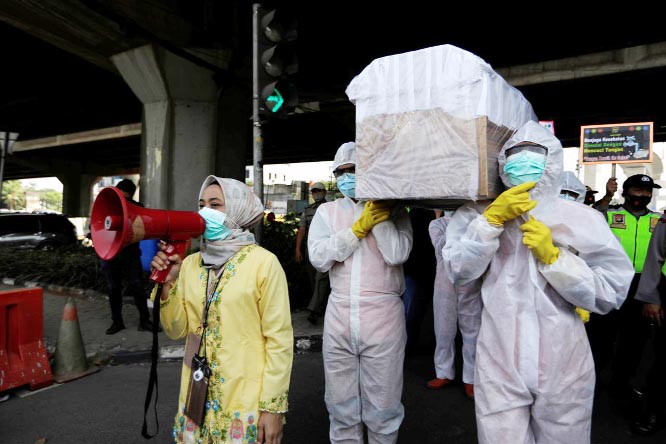
Reuters , Jakarta :
Indonesia reported its biggest rise in new coronavirus cases for a second successive day on Friday, while operations at a second factory in the country’s biggest province were scaled down following the emergence of new infection clusters.
Indonesia passed the 3,000 mark in new daily cases for the first time and added 105 new deaths, as authorities in West Java tackled outbreaks in three factories that the provincial governor said could be due to workers not following health measures.
Among those was at a plant owned by Japanese automaker Suzuki, which cut operations by half after 71 employees tested positive for the coronavirus. On Friday, Suzuki Indonesia said in a statement that it would remain at reduced capacity until conditions were safe.
That added to more than 200 at a factory owned by South Korean firm LG Electronics, which a spokesman said would resume operations next week.
West Java’s governor, Ridwan Kamil, said the infections indicated health protocols were not being fully observed. He said there was an outbreak at a third factory, but did not elaborate.
“When it turns out there are clusters, there was action that didn’t really abide by the protocols, such as not wearing masks diligently, not keeping a safe distance, not washing hands, or there were asymptomatic people running around doing activities,” Kamil said.
Friday’s new cases nationwide brought the infections total to 165,887 and the death toll to 7,169.
Indonesia’s deaths are the most in Southeast Asia and its infections are the second highest after the Philippines.
The capital Jakarta reported on Friday its highest number of infections with 869 new cases, followed by West Java’s 526.
Jakarta, a city of 10 million, on Thursday extended for two more weeks its social restrictions, meaning restaurants or worship houses must continue to operate at limited capacity.
Tri Yunis Miko Wahyono, an epidemiologist at the University of Indonesia, said the government’s plan to incrementally phase out Jakarta’s restrictions should be slowed down.
“Ideally if there were no economic pressures, the restrictions should be tighter,” he said, adding that imposing lockdowns in risky areas could be effective.
Indonesia reported its biggest rise in new coronavirus cases for a second successive day on Friday, while operations at a second factory in the country’s biggest province were scaled down following the emergence of new infection clusters.
Indonesia passed the 3,000 mark in new daily cases for the first time and added 105 new deaths, as authorities in West Java tackled outbreaks in three factories that the provincial governor said could be due to workers not following health measures.
Among those was at a plant owned by Japanese automaker Suzuki, which cut operations by half after 71 employees tested positive for the coronavirus. On Friday, Suzuki Indonesia said in a statement that it would remain at reduced capacity until conditions were safe.
That added to more than 200 at a factory owned by South Korean firm LG Electronics, which a spokesman said would resume operations next week.
West Java’s governor, Ridwan Kamil, said the infections indicated health protocols were not being fully observed. He said there was an outbreak at a third factory, but did not elaborate.
“When it turns out there are clusters, there was action that didn’t really abide by the protocols, such as not wearing masks diligently, not keeping a safe distance, not washing hands, or there were asymptomatic people running around doing activities,” Kamil said.
Friday’s new cases nationwide brought the infections total to 165,887 and the death toll to 7,169.
Indonesia’s deaths are the most in Southeast Asia and its infections are the second highest after the Philippines.
The capital Jakarta reported on Friday its highest number of infections with 869 new cases, followed by West Java’s 526.
Jakarta, a city of 10 million, on Thursday extended for two more weeks its social restrictions, meaning restaurants or worship houses must continue to operate at limited capacity.
Tri Yunis Miko Wahyono, an epidemiologist at the University of Indonesia, said the government’s plan to incrementally phase out Jakarta’s restrictions should be slowed down.
“Ideally if there were no economic pressures, the restrictions should be tighter,” he said, adding that imposing lockdowns in risky areas could be effective.

